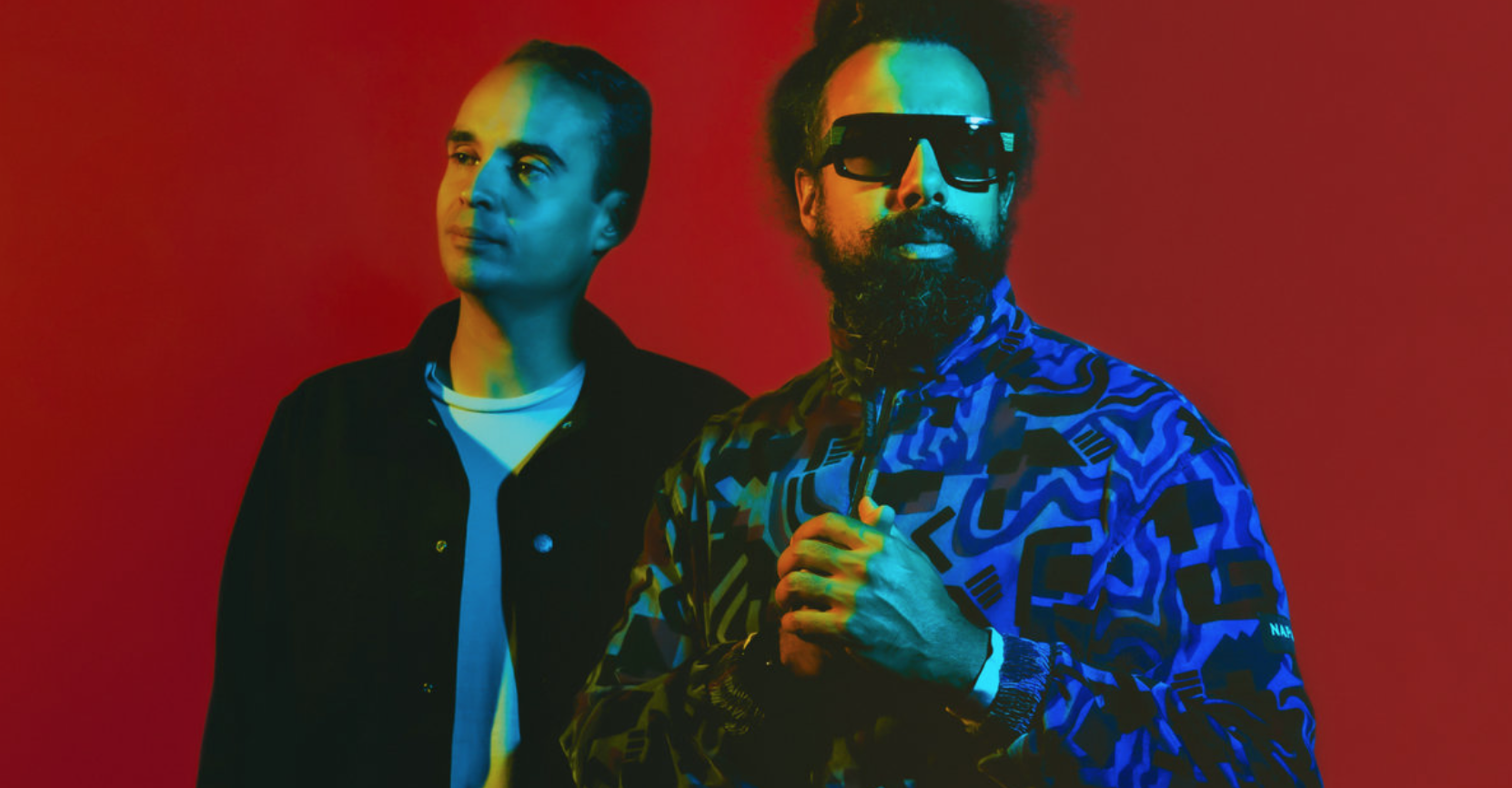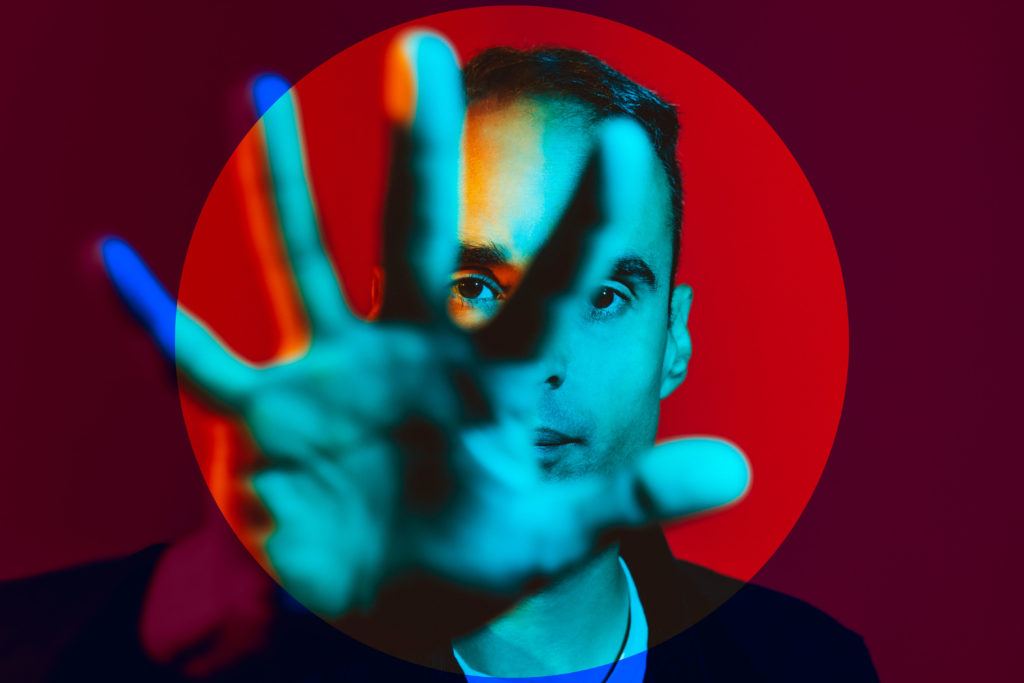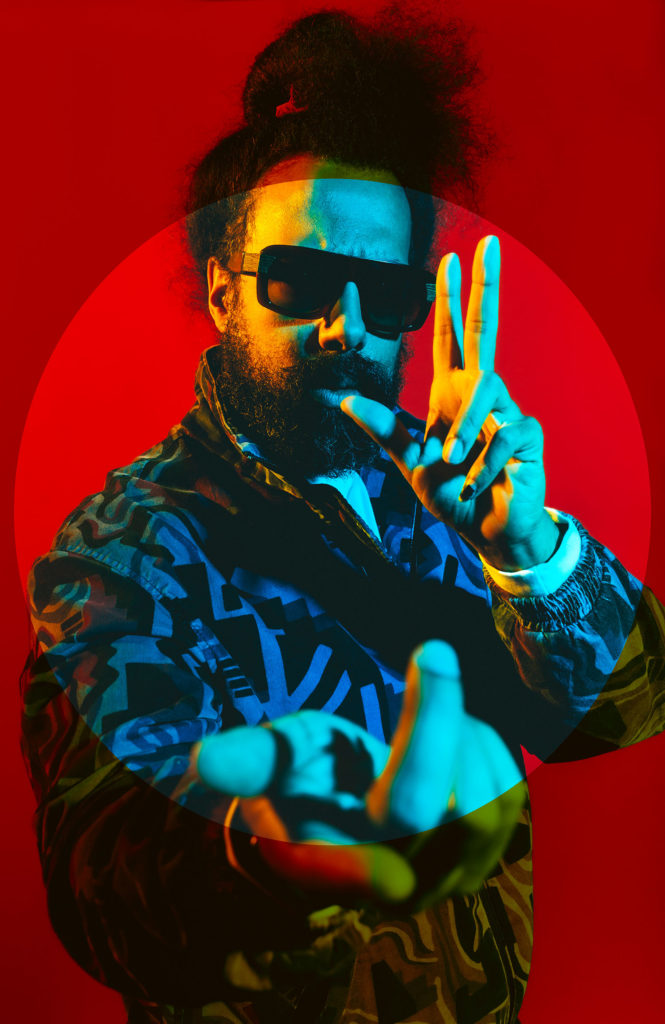20 Questions: Wajatta (Reggie Watts & John Tejada)
An unlikely pairing on Brainfeeder.

20 Questions: Wajatta (Reggie Watts & John Tejada)
An unlikely pairing on Brainfeeder.
On first sight, John Tejada and Reggie Watts, together known as Wajatta (pronounced wa-HA-ta) feel like an unlikely pairing. The former, a regular on XLR8R, is a techno producer found at the vanguard of the West Coast scene since 1994, while the latter positions himself closer to the mainstream with his current work as the bandleader for CBS’ The Late Late Show With James Corden. Uniting them is a shared love of ’90s house, and upon this they’ve prepared two albums, the latest coming via Brainfeeder on Friday, titled Don’t Let Get You Down.
Wajatta came together in an underground warehouse party in 2016, where Tejada was playing a late-night DJ set and Watts, a long-time fan, came to watch. From there, a friendship blossomed, formed over strong coffee and a common interest in ‘80s sci-fi films and old-school hip-hop. Eventually, they made a decision to enter into the studio together, and Wajatta, a mash-up of the artists’ last names, was born.
Broadly speaking, the project blends Tejada’s propulsive techno productions with Watts’ vocals, fully improvised and blissfully soulful, to create spontaneous musical inventions that are funky, hypnotic, and often hilarious. The duo build tracks from scratch, bouncing ideas off one another from initial spark to finished product, and it’s all done face-to-face. They also try to keep their sessions as spontaneous as possible, in a never-ending quest to “capture the freshness,” Watts explains.
The result, Don’t Let Get You Down, is a feel-good album that brings the fun back to electronic music, crackling with the energy of fresh ideas captured at the moment of inspiration. To learn more about it, we dialed in Tejada and Watts one afternoon from Los Angeles, California.
01. What have you been up to recently?
We’re both busy with our solo live sets. Reggie is working on several yet-to-be-announced projects, including his Late Late Show with James Corden, and John is preparing a new single. We both have our own individual tour dates as well. We actually have to try to not get in the studio together because we’ll end up making tonnes of content and it’ll just end up sitting around, so we’re going to save our energy and get back to it later, in not too long a time, hopefully.
We’re also doing a remix of Pépé Bradock’s new project on Circus Company, called Brigitte Barbu “Couvre chef en peau de taupe” (Wajatta remix). We won’t do many remixes, there’s a long story as to why, so we’re going to save them for people who are like heroes to us, like Pépé Bradock! So we’ll normally just do remixes separately. Reggie has also started remixing indie bands. Then the album is out on February 28—tomorrow!
02. Where did you both meet?
JT: We met about three years ago, maybe a bit longer than that. Reggie came to one of my underground warehouse parties in Los Angeles, thinking I lived in Europe, as many people do. We have a lot of mutual friends, and once in a while I’d hear a little glimmer that Reggie wanted to get in contact but there’s a lot of people out there, and it just never happened. When I saw him at the party, I went up to him. He was there quite early as well, and he wanted to keep in touch. We didn’t initially plan to do music; often people will collaborate just to elevate themselves and I didn’t want to come out of the gate with that, so we didn’t actually work on anything for a while. Eventually it got to a point where it was silly not to do much together! Doing music together is kind of how I hang out with my friends, as a lot of musicians do, so there are many people I make music with because that’s how we hang out.
03. Describe Don’t Let Get You Down in no more than two sentences?
It’s a positive affirmation of a hopeful state that exists independent of time.
“When we play live, it’s like Reggie is doing an imitation of what our songs are, which makes it interesting. It’s funny because Brainfeeder asked for a lyric sheet for Apple Music and we were laughing because Reggie’s style of performance is playing with phonemes and words.”
— John Tejada
04. How does Don’t Let Get You Down compare to your first album, Casual High Technology?
It’s a bit darker and more varied. There’s also a bit of a melancholic tone throughout. As we’ve put in more time in the studio, we’ve learned more about the process, and so this time we were both involved in the songs from start to finish. The initial idea for the project was to gather content and then John would work on editing and then Reggie would add something, but now it feels a little bit more like a duo, where we’re starting things together and even finishing things together, which wasn’t one of Reggie’s favorite things to do! Because of this, there’s a little less random in it, and some of the songs have perhaps a deeper soul, even if it still has a positive feel. Tracks like “Realise” and “Don’t Let Get You Down” have a more melancholic vibe, but with a little hope sprinkled in. The title track was made on a rainy Los Angeles Sunday evening, trying to keep a broken oscillator in tune, a whistle, and a few beats, and there we were!
05. Where did you record the album?
JT: At my place, where I have an extra bedroom setup and I’ve collected some fun synths. We use a not-very-fancy microphone. Reggie holds it, even if he’s not supposed to! He sits on a beanbag and off we go. There’s nothing fancy when it comes to the tunes. Everything he does is improvisational. It is just the way he is, and how he works. Even he has trouble remembering what he’s said!
06. How does this improvisation translate to the live performance?
JT. It’s not really possible. Anything you’ve seen Reggie do is improvisational. When we play live, it’s like he’s doing an imitation of what our songs are, which makes it interesting. It’s funny because Brainfeeder asked for a lyric sheet for Apple Music and we were laughing because Reggie’s style of performance is playing with phonemes and words. It’s a style influenced by early Liz Frazier, who in the beginning kind of made up her own language, and that frees him because he can express himself without forcing meaning into something. He plays around with this language, like an alien imitating language, and even with that there’s emotion in it. I’ve even caught myself finding meaning in sections where there isn’t really anything there! It’s abstract in that way.
So yeh, I do what I do when I do my live set. I have these machines, and I loosely improvise the structure, because when playing live, I don’t want things to sound finished. He wants to be able to improvise so it’s like he’s doing an imitation of what we did before, and at this point in our evolution, now it’s really starting to click in. Even though he can go different ways with it and so can I, there are these moments where we know we’re going to change it to go into this bit or we’re going to go into a more chorus-y bit, or he’s going to dance around and I am going to tweak some synths. Our unspoken timing is really clicking in, which I think will be a cool thing for when we make the next batch of tunes.
07. From the outside, you seem like two different characters—one extrovert and one introvert. How does this work as a collaboration?
We’re actually quite similar. Reggie has a dimension of a performance persona but when it’s just the two of us in a room, we’re both pretty similar; we both have a similar attitude towards music and approaches, and we actually have quite similar influences. I think this is why we’ve developed such a strong connection; one thing Reggie has been saying from the beginning is that making music is not supposed to be painful, and that’s something we both agree on. We had a general idea of what we would do together before we even started, so it just comes naturally to us, whether it’s in the studio or on stage.

08. What are the musical touch-points for the Wajatta project?
JW & RW: We come from different influences but we do have some which are the same. We’re both aware of the other’s influences even if we didn’t grow up with them. John came up with everything ‘80s New York, where there was like club music and hip-hop, and also Chicago and Detroit, and the UK swirled this around to make the most interesting music in the late ‘80s and early ‘90s, and so he was influenced by that. For Reggie, he caught a bit of that but he didn’t have a hip-hop moment like John did.
JT: What I liked about these styles was their misuse of technology. They figured out new genres by limitations of gear that wasn’t made for that purpose, and that’s what was magical for that area. Now, everything is geared for a purpose and so it’s tough to invent something new.
RW: I spent a lot of time in Seattle, so the whole Soundgarden and that sort of thing is an influence. Vocalists like Chris Cornell are really great. I’m also into the Nitzer Ebb type of electronic music, that’s a little chunkier, but I’m not so well-versed in the Chicago and Detroit stuff. Depeche Mode is a thing, too.
JT: All this stuff is definitely related, and it fits together. There’s an unwritten rule that we just let the other do what they do. In the beginning, it was going to be as simple as me sending him a clock, because he has some gear, and so he could just do what his solo performance is and I could do what my solo performance is, and we could clock them together and it would sound the way we sound. Nothing is ever forced, and some of the tracks flow into different genres, but somehow it is all connected. That’s important.
09. How important is having fun in making good music?
Very! We don’t think there’s much point otherwise. If something takes too long or isn’t inspiring, we quickly move on to something that might inspire us.
10. What was the last film that impressed you and why?
We kind of just keep returning to the classics, just as we do with music. There’s a lot of new stuff, but we don’t know if it’s overproduced, or people don’t get to make the films they want to, so we always go back to older films and records. From last year, there are the obvious things, but there’s one tiny indie called “Fast Color” that was really cool for what they’ve done with the budget. They gave a different twist to a superhero story, and made it about a different family.
11. What’s the secret to a successful collaboration?
RW: Listening to and seeing the vision collectively.
JT: I find it quite important to collaborate in person. There are so many magical moments that happen while one of us is on their way to figuring out the next step. Something might be happening and the other person might say “Hey, what was that?” Those are sometimes the magic moments that make the core of the new idea. Those ideas just don’t happen working remotely.
12. If you could invite anyone in the world to dinner, who would it be?
RW: Very close friends.
JT: Yeh, it’s a tough one because I don’t believe in ever meeting your heroes. I actually met one the other day and it went horribly wrong so it reinforced that. He just blew me off in the worst way, because that’s what happens when you approach someone at the wrong moment!
I feel like as soon as you meet these people then you can’t help but tell them that they’ve changed your life, and at that point, there’s no possibility to be friends because you’ve changed the dynamic and it’s uncomfortable, more for the person who is getting the compliments! That’s why I thank good friends, too. When working from home, my reward in the evening is to have dinner with my wife or to meet with someone else who is also into music, and we have a music nerd-out, and we enjoy a meal and a beer. I like to leave people I admire at a distance!
13. What constitutes your perfect day?
Cool weather, some inspiration, friends, and a nice meal.

14. If you could have one superpower, what would it be and why?
Teleportation. Because traveling is just not that fun after so many years. The gigs are great but if you’re traveling all day to get there, and then your luggage is lost, it’s not easy. Being alone is not easy either. Traveling together is much more fun, because emergencies became funny, and that’s certainly not the case when you’re alone! There’s also so much time spent traveling. We manage our lives that way, where everything is shortened to be efficient, and teleportation would make us much more efficient.
15. Name three records that stuck with you from 2019?
RW: Trust Ruins All Your Sisters; Oncle Jazz Men I Trust; Flat Worms Into The Iris.
JT: The Future Sound Of London Yage 2019; Plaid Polymer; Robag Wruhme Venq Tolep.
16. Who the most underrated artist out there right now?
RW: Moses Sumney!
JT: It’s almost an insult to call someone underrated. There’s a limitless treasure trove of independent artists that inspire, who can’t be bothered to do a major press campaign. But these are the fun artists to find seemingly on your own and to turn on to other people.
“We have these kinds of influences that don’t totally work for some of the people we’ve worked with, and so with Brainfeeder that doesn’t need to be explained to them, and that’s pretty rare.”
— Wajatta
17. What books are on your nightstand right now?
JT: “Sweat the Technique: Revelations on Creativity from the Lyrical Genius” by Rakim. Just because I am so enamored with this period. I love anybody telling those stories because in those days we didn’t have YouTube, and we didn’t have people filming everything constantly, so anything from that era must be actually heard in person. If they don’t bother to tell the story then nobody knows. That stuff is important to me. Next on the list is another Robert Erwin book!
RW: I haven’t read a book since 1998!
18. What are your favorite lyrics of any song and why?
RW: Depeche Mode “Somebody”
JT: I’ve always tended to really go for the instrumental side of things, hence my own usual output. I feel this way it’s left up more to interpretation rather than someone singing about an emotion or something that’s happened to them. However, I’ve always really loved great MCs. While I’m failing to find a favorite, probably something early by Eric B and Rakim, as his style is just incredible!
19. How do you envisage the Wajatta project developing from here?
That will really be determined by how the album is received. This time around we’re on a proper label that can represent us the way we want, and they’re good because they have the range of styles, which is where we’re coming from. We have these kinds of influences that don’t totally work for some of the people we’ve worked with, and so with Brainfeeder that doesn’t need to be explained to them, and that’s pretty rare. We hope that people like it, and if there is a demand for more then we’d be happy to make more! We’re just finding our groove and there are a lot of things we want to do with the live show if we can, and that all depends on demand, too. We’d actually really like to do a proper show one day with more design for the stage.
20. What’s the first thing you’ll do after answering these questions?
Eat some hummus!
Don’t Let Get You Down is out on February 28, with pre-order here.

